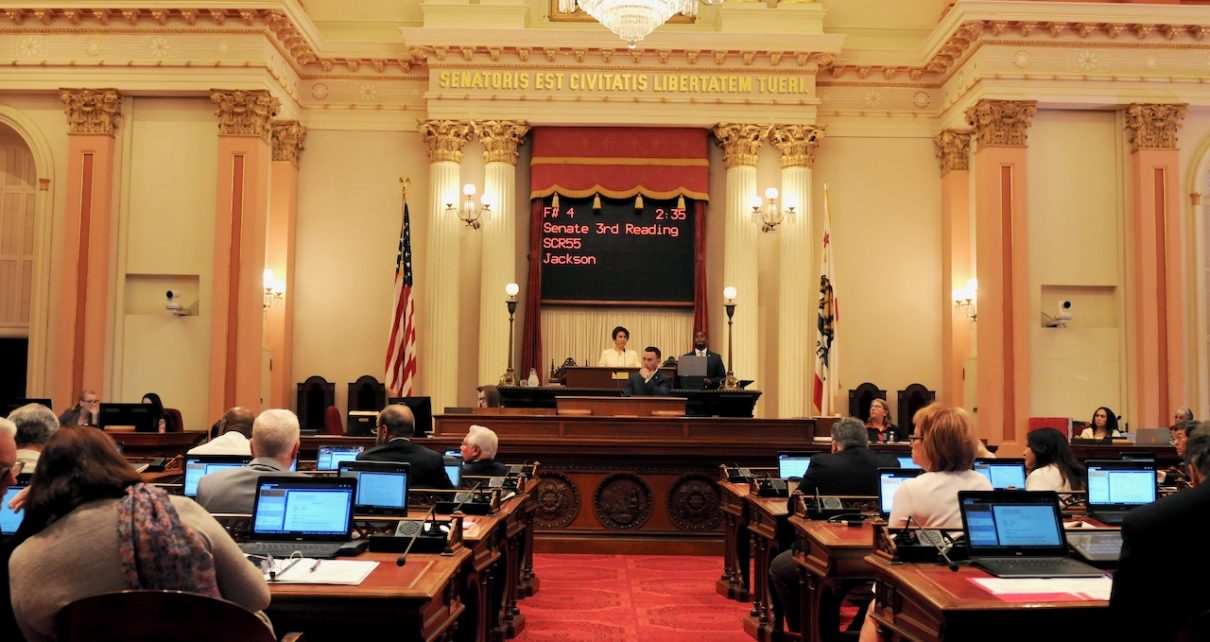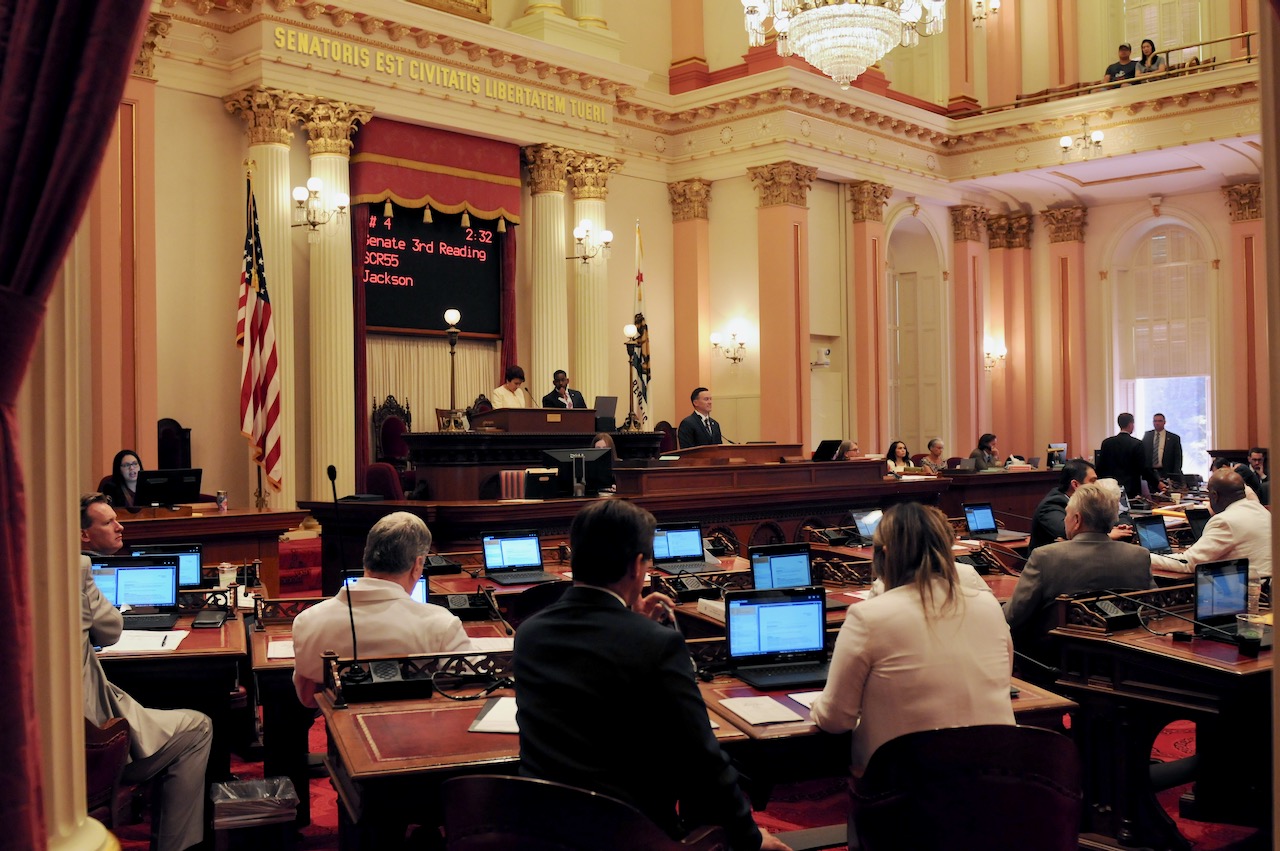
California State Senate. (Photo: Kevin Sanders for California Globe)
The Joint Legislative Ethics Committee
The committee are required to conduct at least semiannually an orientation course on the relevant ethical issues and laws relating to lobbying
By Chris Micheli, September 13, 2024 1:00 pm
Government Code Section 8940 created the Joint Legislative Ethics Committee. The committee consists of three Members of the Senate and three Members of the Assembly who are all selected as provided for in the Joint Rules of the Senate and Assembly.
Of the three members appointed from each house, at least one from each house has to be a Democrat and at least one a Republican. Section 8941 authorizes the committee to make rules governing its own proceedings.
Section 8942 requires funds for the support of the committee to be provided from the Contingent Funds of the Assembly and the Senate in the same manner that those funds are made available to other joint committees of the Legislature.
Section 8943 requires the committee to have power to investigate and make findings and recommendations concerning alleged violations by Members of the Legislature. The committee may, on its own action, initiate an investigation of a Member of the Legislature. The action may be taken only if specified requirements are satisfied.
Section 8944 allows any person to file a statement alleging a violation of Article 2 with the committee. The statement, in order to be valid, must satisfy all five of the specified requirements.
Section 8945 states that, if the committee determines that the complaint does not allege facts, directly or upon information and belief, sufficient to constitute a violation of any of the specified laws, then the complaint must be dismissed and the complainant and respondent are notified.
However, if the committee determines that the complaint does allege facts, directly or upon information and belief, sufficient to constitute a violation of any of the specified provisions, then the committee is required to promptly investigate the alleged violation. If the committee finds that probable cause exists for believing the allegations of the complaint, it has to fix a time for a hearing in the matter. If, after the preliminary investigation, the committee finds that probable cause does not exist for believing the allegations of the complaint, the committee must dismiss the complaint and notify the parties.
Section 8946 provides that, after the complaint has been filed, then the respondent is entitled to examine and make copies of all evidence in the possession of the committee relating to the complaint.
Section 8947 states that, before the hearing has commenced, it is required to issue subpoenas and subpoenas duces tecum at the request of any party.
Section 8948 provides that, at any hearing held by the committee, oral evidence is taken only on oath or affirmation; each party can be represented by legal counsel; they can to call and examine witnesses; to introduce exhibits; and to cross-examine opposing witnesses; and the hearing is to be open to the public.
Section 8949 states that any official or other person whose name is mentioned at any investigation or hearing of the committee and who believes that testimony has been given which adversely affects him, they have the right to testify or, at the discretion of the committee, to file a statement of facts under oath relating solely to the material relevant to the testimony of which he complains.
Section 8950 requires the committee to state its findings of fact. If the committee finds that the respondent has not violated any provisions, then it must order the action dismissed, and notify the respondent and complainant, and transmit a copy of the complaint and the fact of dismissal to the house in which the respondent serves, the Attorney General, the Fair Political Practices Commission, and the district attorney of the appropriate county.
Section 8951 specifies that nothing precludes any person from instituting a prosecution for violation of any provision, unless that person has filed a complaint with the committee concerning the violation, in which case that person may not file a complaint with the district attorney of the appropriate county to institute a criminal prosecution for the violation until the committee has made its determination of the matter or a period of 120 days has elapsed since the filing of the complaint with the committee.
Section 8952 provides that the filing of a complaint with the committee suspends the running of the statute of limitations applicable to any violation of law while the complaint is pending.
Section 8953 requires the committee to maintain a record of its investigations, inquiries, and proceedings. All records, complaints, documents, reports filed with or submitted to or made by the committee, and all records and transcripts of any investigations, inquiries or hearings of the committee under this article are deemed confidential and are not open to inspection by any person other than a member of the committee, an employee of the committee, or a state employee designated to assist the committee, except as otherwise specifically provided in this article.
Section 8954 requires all actions of the committee to address the concurrence of two members of the committee from each house.
Section 8955 allows the committee to render advisory opinions to Members of the Legislature and their application and construction. The committee may secure an opinion from the Legislative Counsel for this purpose or issue its own opinion.
Section 8956 requires the appropriate legislative ethics committees to conduct at least semiannually an orientation course of the relevant statutes and regulations governing official conduct. The curriculum and presentation of the course shall be established by house rules.
In addition, the committee are required to conduct at least semiannually an orientation course on the relevant ethical issues and laws relating to lobbying, in consultation with the FPPC. The course must also include information on each house of the Legislature’s policies against harassment, including sexual harassment, in connection with lobbying activities. One of the semiannual courses is to be held prior to June 30 of each year.
Article 1 of Chapter 1.5 of Part 1 of Division 2 of Title 2 deals with the numbering and election of legislation. Section 9000 provides that the Legislature consists of 40 Senators and 80 Assembly Members. Section 9001 says that the term of office of a Senator is four years while the term of office of a Member of the Assembly is two years.
Section 9003 provides that, at the general election in every fourth year after 1908, a Senator is to be elected in each odd-numbered senatorial district. At the general election in every fourth year after 1910, a Senator is elected in each even-numbered district.
Section 9003 states that, at the general election in every even-numbered year, a Member of the Assembly is elected in each of the Assembly districts.
Section 9004 specifies that, when the Legislature convenes or is convened in regular or extraordinary session during or following a war or enemy-caused disaster and vacancies exist to the extent of one-fifth or more of the membership of either house caused by such disaster, either by death, disability or inability to serve, the vacancies must be temporarily filled as provided in this section.
The remaining members of the house in which the vacancies exist, regardless of whether they constitute a quorum of the entire membership, are required by a majority vote of the members appoint a qualified person as a pro tempore member to fill each such vacancy. The appointments are to be made so that each assembly or senatorial district in which a vacancy exists is to be represented, if possible, by a pro tempore member who is a resident of that district and a registered elector of the same political party as of the date of the disaster as the last duly elected member from such district.
- Sabotage Prevention Act - December 14, 2024
- Why Would the Legislature Request? - December 13, 2024
- A Different Type of Legislative Statement? - December 12, 2024



